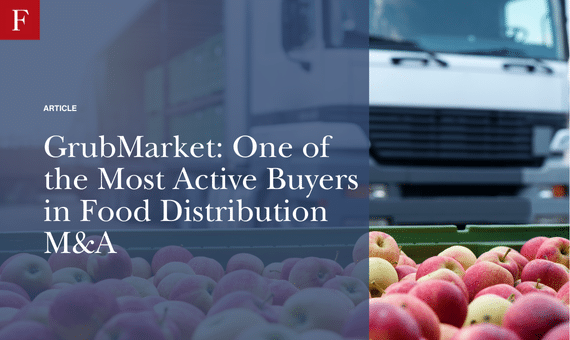
GrubMarket: One of the Most Active Buyers in Food Distribution M&A
GrubMarket, a B2B food marketplace that primarily sells to retail grocers, has become one of the most active buyers in food distribution M&A. Since its founding in 2014 the company has made north of 60 acquisitions, with the majority of those acquisitions focused on B2B produce distributors.
Why is GrubMarket, a technology company, buying up B2B food distributors? In this article, we cover how the company grew from a startup venture to one of the largest private food tech companies in the U.S., fueled by millions of dollars in funding, a bold acquisition strategy, and a mission to digitally transform the global and American food supply chain.
When Mike Xu founded GrubMarket in San Francisco, it could have been passed off as another tech company trying to enter the online grocery space. But Xu was a different type of Silicon Valley founder. He grew up in rural China, surrounded by farmers and growers, before landing at the University of Wisconsin to study Computer Science. During that time, Xu rented a small plot of land from the university to run a vegetable farm. Those dual experiences shaped Xu’s vision of modernizing the food supply chain.
Xu started his career in tech, working at titans like Oracle, but maintained a passion for solving problems within the food system. As one of the least digitized industries in the U.S., fresh foods presented a compelling case. Highly perishable products that rely on sophisticated systems, yet business activities are still predominantly offline – pricing lists manually emailed each week, orders taken over the phone, and inventory managed through legacy systems.
Xu saw an opportunity to modernize the system by leveraging technology to help operators do more high-value work: moving products, developing new sales channels, and connecting with customers.
GrubMarket launched with a hybrid business model serving both B2C (via its online grocery channel) and B2B (through its wholesale eCommerce platform) customers. While online grocery was capturing customer (and investor) attention, it became clear there was an untapped opportunity on the B2B side, specifically in perishable foods. Xu would need to build the company’s supplier network alongside development of its technology platform. With millions in funding from backers like 301, Grosvenor Food & AgTech, and Tiger Global, Xu and his team had the capital to pursue their growth strategy. Enter M&A, a key ingredient in the GrubMarket’s development.
Click here to continue reading the article.














